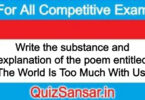
Write a short note on different aspects of Hardy’s genius.
Write a short note on different aspects of Hardy’s genius.
Ans.
Thomas Hardy’s career divides itself into three periods. The first of these contains his work as a novelist, and ends with Jude the Obscure.
The second period consists of The Dynasts, no doubt the greatest single achievement of his career. It is the summation of Hardy’s vision of life.
The third period may be said to begin with Time’s Laughing Stocks in 1909, and is devoted to lyric poetry The lyrical period, however, does not give us an entirely new development of his genius. While he was writing novels, he had occasionally experimented with poetry, and some of the results were published in Wessex Poems (1898), and Poems of the Past and the Present (1901), between Jude the Obscure and The Dynasts. The volumes published after The Dynasts also contained a good many more of these earlier poems, But after 1909 Hardy wrote little but lyrical poetry, and this may therefore be truly called his lyrical period. It represents a new concentration of his lyrical power, but certainly no diminution of it.
Devotion to lyrical expression produced a mastery almost as signal in its kind as his command of the art of fiction; and his 70th year saw him beginning with Time’s Laughing Stocks, the series of volumes Satires of Circumstance (1914), Moments of Vision (1917), Late Lyrics and Earlier (1922).- Human Shows, Far Phantasies (1925) and the posthumous volume Winter Words (1928) which revealed him as the most original, the most poignant and also the most copious of contempc3rary lyric poets.
Hardy’s fame as a novelist eclipsed his reputation as a poet for quite sometime but soon his poetic merits were recognized and now he is ranked among the major twentieth century poets. In the words of George Sampson: “His novels gave distinction to the nineteenth century; his poems are the most considerable written in the twentieth.”
-
Write the critical appreciation of the poem No. 12 entitled Far Below Flowed.
-
Write the critical appreciation of the poem No. 11 entitled Leave this Chanting.






